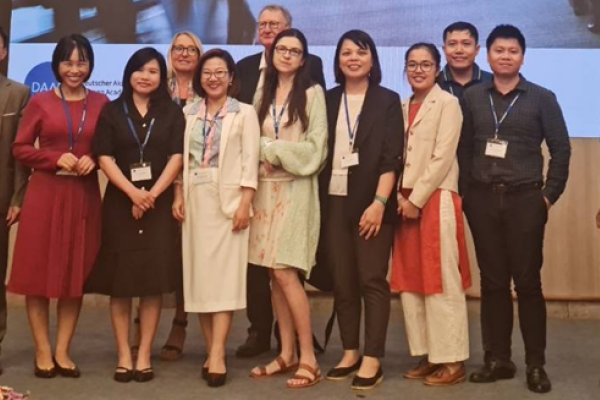11.07.2023

In March/April 2023, the "Mekong Summit 2023" of the Mekong River Commission took place in Vientiane/Laos, to which Prof. Dr. rer. nat. Harro Stolpe travelled together with former DAAD scholarship holders. The focus was on water management in times of climate change.
Prof. Stolpe and his colleagues have been researching the Mekong and especially the Mekong Delta in Vietnam for more than 20 years. At 4,350 km, the Mekong is one of the longest rivers on earth. Riparian countries are China, Myanmar, Laos, Thailand, Cambodia and Vietnam.
In preparation for the "Mekong Summit 2023", Prof. Stolpe organised a seminar and a one-week excursion to the Mekong Delta together with the Institute of Tropical Technology (ITT) of the TH Köln, in which 12 alumni from Vietnam took part - all of them now successfully working as scientists and engineers in engineering offices, administrations, ministries and universities in Vietnam. The DAAD had invited the former scholarship holders from Southeast Asia to the "Mekong Summit 2023".
The excursion started in the middle of the Mekong Delta in the city of Can Tho. It went to the rice-growing areas and the huge shrimp farming areas, where the group of participants visited weirs and sluices, examined water samples and interviewed stakeholders - rice farmers, shrimp farmers and sluice operators. The participants were particularly impressed by the landscape of man-made canals, rice fields, fruit plantations, mangrove swamps and fish and shrimp farms.
The self-inflicted serious problems of the Mekong Delta also became clear: the difficult freshwater supply, water pollution from sewage, fertilisers, pesticides, medicines from aquaculture, the stagnation of sewage in the ditches and canals, land subsidence due to excessive groundwater extraction and much more.
The Mekong Delta represents the last stage of the Mekong River on its way through five countries. It is used for water and energy production, wastewater disposal, power plant cooling, sand extraction for concrete structures, and as a waterway for goods transport and tourism.
Conflicts arise when too much water is dammed or withdrawn in the countries above (reservoirs in China, Laos and Cambodia), so that water is lacking below and, most recently, also in the Mekong Delta. Together with the climate-induced rise in sea water, there is then increased saltwater intrusion into the waters in the Mekong Delta. This in turn makes irrigation for rice cultivation and drinking water supply more difficult.
After the excursion, the participants travelled on to Vientiane in Laos. There, in the framework of the "Mekong Summit 2023", about 500 international participants discussed the improvement of transboundary cooperation. Members of the Mekong River Commission are Thailand, Laos, Cambodia and Vietnam.
Improving cooperation between the Mekong riparians is particularly urgent in times of climate change. It is about equitable water distribution and use and about the necessary precautions due to climate developments.
In March/April 2023, the "Mekong Summit 2023" of the Mekong River Commission took place in Vientiane/Laos, to which Prof. Dr. rer. nat. Harro Stolpe travelled together with former DAAD scholarship holders. The focus was on water management in times of climate change.
Prof. Stolpe and his colleagues have been researching the Mekong and especially the Mekong Delta in Vietnam for more than 20 years. At 4,350 km, the Mekong is one of the longest rivers on earth. Riparian countries are China, Myanmar, Laos, Thailand, Cambodia and Vietnam.
In preparation for the "Mekong Summit 2023", Prof. Stolpe organised a seminar and a one-week excursion to the Mekong Delta together with the Institute of Tropical Technology (ITT) of the TH Köln, in which 12 alumni from Vietnam took part - all of them now successfully working as scientists and engineers in engineering offices, administrations, ministries and universities in Vietnam. The DAAD had invited the former scholarship holders from Southeast Asia to the "Mekong Summit 2023".
The excursion started in the middle of the Mekong Delta in the city of Can Tho. It went to the rice-growing areas and the huge shrimp farming areas, where the group of participants visited weirs and sluices, examined water samples and interviewed stakeholders - rice farmers, shrimp farmers and sluice operators. The participants were particularly impressed by the landscape of man-made canals, rice fields, fruit plantations, mangrove swamps and fish and shrimp farms.
The self-inflicted serious problems of the Mekong Delta also became clear: the difficult freshwater supply, water pollution from sewage, fertilisers, pesticides, medicines from aquaculture, the stagnation of sewage in the ditches and canals, land subsidence due to excessive groundwater extraction and much more.
The Mekong Delta represents the last stage of the Mekong River on its way through five countries. It is used for water and energy production, wastewater disposal, power plant cooling, sand extraction for concrete structures, and as a waterway for goods transport and tourism.
Conflicts arise when too much water is dammed or withdrawn in the countries above (reservoirs in China, Laos and Cambodia), so that water is lacking below and, most recently, also in the Mekong Delta. Together with the climate-induced rise in sea water, there is then increased saltwater intrusion into the waters in the Mekong Delta. This in turn makes irrigation for rice cultivation and drinking water supply more difficult.
After the excursion, the participants travelled on to Vientiane in Laos. There, in the framework of the "Mekong Summit 2023", about 500 international participants discussed the improvement of transboundary cooperation. Members of the Mekong River Commission are Thailand, Laos, Cambodia and Vietnam.
Improving cooperation between the Mekong riparians is particularly urgent in times of climate change. It is about equitable water distribution and use and about the necessary precautions due to climate developments.